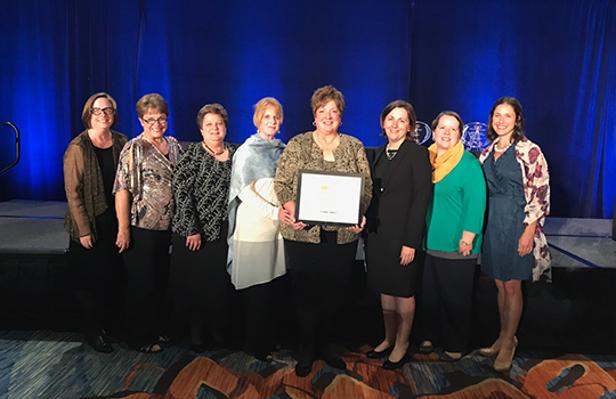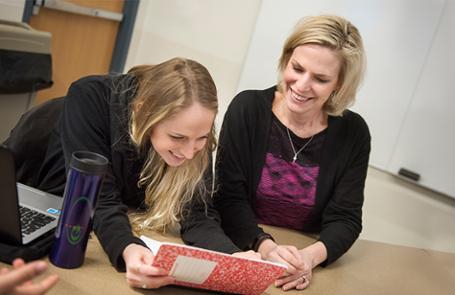Center of Excellence designation points to Purdue Nursing’s advances in learning, innovation
Written by By Phillip Fiorini
The Purdue School of Nursing has been named a Center of Excellence for Nursing Education by the National League for Nursing (NLN), a prestigious distinction highlighting the School’s excellence in enhancing student learning and professional development.
Purdue Nursing was honored at a ceremony during the September NLN Education Summit in San Diego, joining 56 universities and health care organizations that have earned the NLN’s Center of Excellence designation since 2004. Gloria Jacobson, chair of the Centers of Excellence review panel, told conference attendees the program recognizes schools of nursing and health care organizations that set high standards, are committed to continuous quality improvement, and demonstrate sustained, evidence-based, and substantive innovation.
“Purdue Nursing has always had a very robust, positive reputation for the quality of education provided and excellent student outcomes. I think this designation has validated that reputation, giving us a gold seal of approval, if you will, from one of the premier organizations for nursing education,” says Pam Karagory, a clinical associate professor of nursing. “Prospective students can see that this reputation has been validated through a rigorous, robust assessment. So, everything they’ve heard is true.”
Embrace Systems Thinking
One of the highlights acknowledged by this designation is the infusion of systems and quality improvement skills across every nursing program offered at Purdue. It’s why Megan Baehl, a 2017 BSN graduate from Newburgh, Indiana, is excited about her future as a registered nurse.
“The knowledge and hands-on experience I have gained in quality improvement while in Purdue’s nursing program has provided me with many opportunities I could have never imagined,” Baehl says.
For Megan Hebdon (DNP 2014), the flexibility of the Doctor of Nursing Practice (DNP) program was a big draw. She customized her studies to align with a passion for oncology nursing and interest in cancer survivorship.
“I attribute much of my growth as a student, nurse, and researcher to the guidance and support I received at Purdue,” says Hebdon, now an assistant professor of nursing at Radford University in Virginia.
To the prospective student, the NLN designation demonstrates that Purdue Nursing faculty are invested in them and their future, that the business of professional development is a lifelong commitment, says Jane Kirkpatrick, professor emerita and interim head of the School of Nursing.
“Our faculty are committed to ensuring that our graduates have the tools they need to thrive in their careers,” she says. “The stakes are high for an industry that relies on the 3.6 million nurses at the heart of health care delivery in this country.”
Adds Sara McComb, a professor who has a joint appointment in the schools of Nursing and Industrial Engineering: “We’re trying to show our students that when they encounter a problem in the practice environment, they need to consider what happens if each person created a temporary workaround instead of choosing to examine the system issues that contribute to the problem. By using QI skills, nurses cannot only provide the best possible care, they can also make the process of care delivery better for their patients and themselves.”
Growing Programs
The school is in the second year of a planned four-year undergraduate program expansion that will double the number of BSN students (targeting 800 students) and expand faculty ranks by 36 individuals. Concurrently, a PhD program, launched in fall 2017, and a new psychiatric mental health track will start in summer 2018.
The Purdue School of Nursing master’s program ranked in the top 28 percent of programs at No. 82 of 292 programs, in U.S. News & World Report graduate school rankings released in March 2017, while its DNP program was in the top 35 percent as No. 66 among 186 programs.
In addition, the school has emphasized deeper engagement with stakeholders — what it calls “practice partners” — in the health care industry as well as through its advisory council. The school also benefits from an infusion of non-nursing faculty, specifically from engineering and sociology, pedagogical research sponsored by the NLN and concurrent university initiatives for active learning, and faculty development in quality improvement.
McComb says reaching out to non-nursing faculty also has helped build bridges with other academic disciplines. She points to the cultural transformation taking place that ensures Purdue graduates understand the value of systems perspective in all phases of health care delivery.
“That’s the wonderful thing about this faculty. We have such diverse expertise. And we can bring it together around how we’re going to improve our educational programs to prepare our students for the future,” McComb says.




